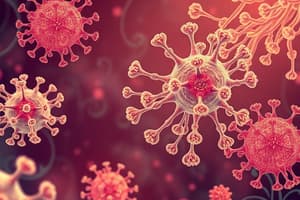Podcast
Questions and Answers
What distinguishes an immunogen from an antigen?
What distinguishes an immunogen from an antigen?
- An antigen can be a hapten.
- An antigen is only employed in cell-mediated immunity.
- An immunogen always has epitopes. (correct)
- An immunogen cannot stimulate an immune response.
Which of the following correctly describes an epitope?
Which of the following correctly describes an epitope?
- It is a type of hapten.
- It is the smallest part of an antigen that can be recognized by an antibody. (correct)
- It is a binding site on an antibody.
- It is a foreign substance that induces an immune response.
What is the role of a paratope in the immune response?
What is the role of a paratope in the immune response?
- It is an antibody binding site for specifically recognizing antigens. (correct)
- It is a type of antigen that can induce an immune response.
- It identifies haptens in the bloodstream.
- It serves as a carrier for low molecular weight substances.
Which of the following statements best describes haptens?
Which of the following statements best describes haptens?
Which factors could influence the immunogenicity of a substance?
Which factors could influence the immunogenicity of a substance?
Which statement regarding heterophile antigens is true?
Which statement regarding heterophile antigens is true?
How many different epitopes does human albumin contain?
How many different epitopes does human albumin contain?
Why are antigens considered incomplete when classified as haptens?
Why are antigens considered incomplete when classified as haptens?
What laboratory test is used to diagnose infectious mononucleosis caused by the Epstein Barr Virus?
What laboratory test is used to diagnose infectious mononucleosis caused by the Epstein Barr Virus?
Which type of antibody is detected in the cold agglutinins test for patients with mycoplasma pneumonia?
Which type of antibody is detected in the cold agglutinins test for patients with mycoplasma pneumonia?
What type of antigens do the VDRL and RPR tests utilize for detecting syphilis?
What type of antigens do the VDRL and RPR tests utilize for detecting syphilis?
What component of the immune response do soluble antigens mainly activate?
What component of the immune response do soluble antigens mainly activate?
Which blood group antigens are included in soluble antigens?
Which blood group antigens are included in soluble antigens?
Which of the following statements about cellular antigens is true?
Which of the following statements about cellular antigens is true?
In which scenario would you expect to find the presence of heterophile antibodies?
In which scenario would you expect to find the presence of heterophile antibodies?
What type of cells are indicated for MHC class I molecules?
What type of cells are indicated for MHC class I molecules?
Which factor does NOT contribute to a substance being immunogenic?
Which factor does NOT contribute to a substance being immunogenic?
What typically characterizes molecules with weak immunogenicity?
What typically characterizes molecules with weak immunogenicity?
Why are proteins generally powerful immunogens?
Why are proteins generally powerful immunogens?
Which of the following statements about D-amino acids is accurate?
Which of the following statements about D-amino acids is accurate?
How does high or low dosage of antigens influence immune response?
How does high or low dosage of antigens influence immune response?
Which type of protein is more likely to be immunogenic?
Which type of protein is more likely to be immunogenic?
What role does enzymatic degradation play in immunogenicity?
What role does enzymatic degradation play in immunogenicity?
Which method of administration does NOT influence the immune response?
Which method of administration does NOT influence the immune response?
What is the primary advantage of parenteral routes over oral routes for administering experimental immunogens?
What is the primary advantage of parenteral routes over oral routes for administering experimental immunogens?
Which lymphoid organ is primarily targeted by antigens injected intravenously?
Which lymphoid organ is primarily targeted by antigens injected intravenously?
What role do adjuvants play when mixed with antigens before administration?
What role do adjuvants play when mixed with antigens before administration?
How does a high affinity antibody differ from a low affinity antibody?
How does a high affinity antibody differ from a low affinity antibody?
What is meant by cross reactivity in immunology?
What is meant by cross reactivity in immunology?
What effect does the depot effect have on immune response?
What effect does the depot effect have on immune response?
Which of the following describes a heterophile antibody?
Which of the following describes a heterophile antibody?
Which factor is NOT a characteristic of weak or non-responders in immune response?
Which factor is NOT a characteristic of weak or non-responders in immune response?
Flashcards are hidden until you start studying
Study Notes
Immunogens and Antigens
- Immunogens are substances that stimulate a specific immune response (humoral or cell-mediated immunity).
- Antigens are substances that can bind specifically with antibodies or sensitized T lymphocytes.
- Epitopes are small, specific parts of an antigen that bind to antibody or T-cell receptors; they are also called antigenic determinants.
- Paratope refers to the antigen-binding site on an antibody.
- Haptens are small molecules incapable of inducing an immune response on their own but become immunogenic when coupled to a larger carrier protein.
Factors Affecting Immunogenicity
- Foreignness: The immune system generally recognizes and responds to foreign substances, not self-components.
- Molecular size: Molecules with a molecular weight of less than 5000-10,000 generally have weak or no immunogenicity.
- Chemical nature: Proteins are the most potent immunogens, followed by complex polysaccharides.
- Degradability: Immunogens are susceptible to enzymatic degradation during antigen processing by antigen-presenting cells.
- Methods of antigen administration:
- Dosage: Very high or very low doses can induce tolerance. Repeated administration of booster doses stimulates a strong immune response.
- Route: Parenteral routes (e.g., injection) are preferred for inducing strong immune responses compared to oral routes.
- Adjuvants: Substances that enhance the immune response to an antigen.
- Host genetic factors: Individuals exhibit different responses to antigens: strong responders, weak responders, non-responders.
Forms of Antigen-Antibody Binding
- Lock and Key: The most efficient immunological responses involve high-affinity antibodies that perfectly match the antigen.
- Low Affinity: Antibodies can sometimes bind to antigens with a "poor fit," leading to weaker reactions.
Heterophile Antigens and Antibodies
- Cross Reactivity: Antibodies can react with similar epitopes on different antigens, sometimes leading to unintended immune responses.
- Heterophile Antibodies: Antibodies produced against one antigen that can also bind to a different, unrelated antigen.
Laboratory Tests Based on Heterophile Antigens
- Paul-Bunnell Test: Used to diagnose infectious mononucleosis (Epstein-Barr Virus) by detecting heterophile antibodies that agglutinate sheep red blood cells.
- Cold Agglutinins: Used to detect antibodies in patients with mycoplasma pneumonia that agglutinate human group O red blood cells at low temperatures.
- VDRL and RPR Tests: Used to detect antibodies against cardiolipin antigen (reagin) in sera of patients with syphilis.
Types of Antigens According to Source
- Bacterial Antigens: Include capsular, flagellar, soluble (e.g., exotoxins, enzymes), and cell-wall antigens.
- Viral Antigens: Include viral proteins and genetic material. Some viral antigens can activate multiple clones of T lymphocytes leading to increased cytokine secretion.
- Human Tissue Antigens: Include blood group antigens (A, B, RH) and histocompatibility antigens (MHC/HLA) present on tissue cell membranes.
- MHC I: Present on all nucleated cells.
- MHC II: Primarily expressed on antigen-presenting cells.
Studying That Suits You
Use AI to generate personalized quizzes and flashcards to suit your learning preferences.




